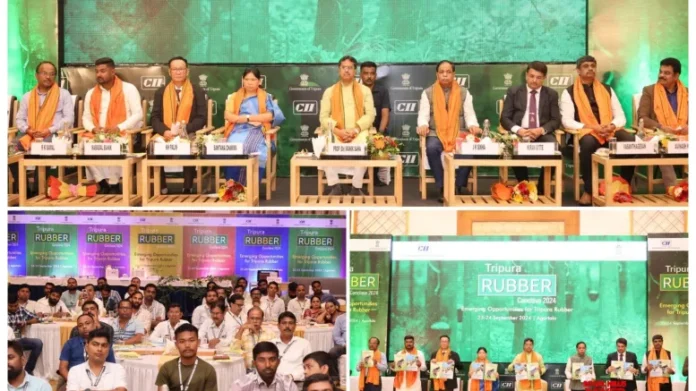Tripura Chief Minister Manik Saha recently announced the establishment of a second rubber park in Santirbazar during the Tripura Rubber Conclave-2024. This initiative marks a significant step forward for the state’s industrial growth and showcases its crucial role in India’s rubber production. The event attracted stakeholders from various sectors, emphasizing the importance of rubber cultivation and processing in the region’s economy.
The new rubber park aims to enhance the production and processing capabilities of rubber in Tripura. The Chief Minister underscored the need for modern infrastructure and technology to support rubber growers and manufacturers. With this new park, the government seeks to attract investments, create jobs, and elevate the standards of rubber processing to meet both domestic and international demand.
Tripura has emerged as a leading player in rubber production, contributing significantly to the national output. The state has about 66,000 hectares of rubber plantations, producing approximately 60,000 metric tons of rubber annually. By establishing the second rubber park, the government aims to further increase production capacity and support local farmers in improving their livelihoods. The Chief Minister expressed optimism that the park would encourage more farmers to invest in rubber cultivation, which has become a lucrative cash crop.
During the conclave, various experts and industry leaders shared insights into the current trends and challenges facing the rubber sector. They discussed the potential for expanding rubber cultivation in Tripura and the need for innovative solutions to enhance productivity. The speakers highlighted that establishing processing facilities within the state would reduce the dependence on external markets for finished products, thus retaining more value within the local economy.
The establishment of the rubber park also aligns with the government’s broader vision of promoting sustainable agriculture and supporting the rural economy. The Chief Minister emphasized the importance of integrating modern agricultural practices and sustainable methods into rubber cultivation. He encouraged farmers to adopt environmentally friendly practices that would enhance soil health and increase yield.
The initiative is expected to boost the local economy by creating direct and indirect employment opportunities. With the development of the rubber park, skilled and unskilled workers will find job prospects in various fields, including rubber tapping, processing, and logistics. This employment growth will help uplift many families in the region, contributing to the overall economic development of Tripura.
In addition to job creation, the rubber park will also facilitate the development of ancillary industries. Businesses related to the rubber industry, such as tire manufacturing, footwear production, and rubber goods manufacturing, will benefit from the park’s establishment. The government aims to foster a conducive environment for these industries to thrive, which will further enhance the state’s industrial landscape.
The government plans to provide support to entrepreneurs and small businesses interested in investing in the rubber park. By offering incentives and subsidies, the state aims to attract both local and national investors. This financial support will be crucial in establishing the necessary infrastructure and ensuring the smooth functioning of the park.
Moreover, the new rubber park will play a vital role in positioning Tripura as a hub for rubber production and processing in Northeast India. The government envisions the state becoming a major player in the rubber market, not just within India but also in the international arena. By enhancing production capabilities and establishing a robust supply chain, Tripura can cater to the growing demand for rubber and its products globally.
As the rubber park takes shape, the government remains committed to monitoring its progress and ensuring its alignment with the broader goals of industrial development and sustainable agriculture. Chief Minister Saha assured the attendees of the conclave that the government would actively engage with stakeholders to address any challenges and promote a collaborative approach towards growth.
The establishment of the second rubber park in Santirbazar signifies a new chapter for Tripura’s industrial journey. With the potential to transform the state’s rubber sector, this initiative will create a ripple effect on the economy, fostering innovation, employment, and sustainable development. The government’s proactive approach sets a positive tone for the future, promising a flourishing rubber industry that can serve as a model for other states in India.




